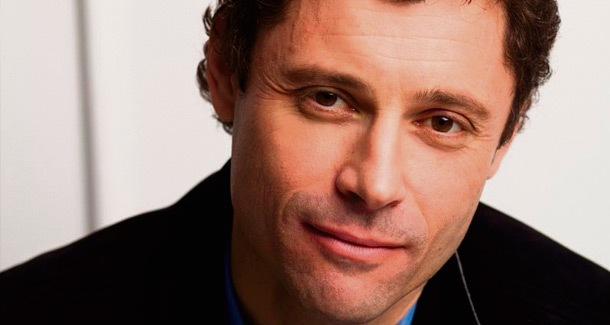Multi-award winning, internationally acclaimed Melbourne novelist, Elliot Perlman, is a consummate storyteller. Articulating authentic and engaging narratives, he weaves together tales of humanity with insight, intelligence, wit and humour in a kaleidoscopic variety of literary styles. I spoke to Perlman in advance of his Wheeler Centre writer’s talk, Good Conversation, taking place at Montalto Olive Grove and Vineyard on Friday, April 11.
PEARL: What was it like to see your first novel, Three Dollars, made into a film? Was it difficult to shift from novel to screenplay?
PERLMAN: It was terribly exciting! I will be forever grateful. Director, Rob Connelly took me under his wing and taught me as much as he had time to teach me. He had the screenwriting background and I could offer a fair knowledge of the book. Co-producer, John Maynard also really got the book so I thought I could trust them.
PEARL: When writing a novel as voluminous as Seven Types of Ambiguity, how do you keep track of the structural elements that hold it all together?
PERLMAN: I have a series of notebooks. I write down thoughts as they occur to me from grand sweeping ideas to the tiniest fragments of language or dialogue. I construct a chart forming the architecture of the novel and that’s what I keep referring to.
PEARL: You spend a great deal of time researching your subjects. It is to give you greater confidence in the writing or is it purely to provide accuracy?
PERLMAN: Probably both. With subjects like the Civil Rights Movement and the Holocaust I feel a moral obligation to try to get the history as close to perfect as I can. I get confidence from having facts beneath my feet. When writing about a person’s occupation I try to speak to someone in that occupation so I can inhabit the character better.
PEARL: When you went to Poland to do research for The Street Sweeper, what was your first reaction to Auschwitz?
PERLMAN: Terror, trepidation and anxiety. I knew quite well, even more than most people what had happened there. I had lost family in the Holocaust. My grandparents were Eastern European Jews who left Europe in the late 1920s, but virtually everyone they left behind perished.
PEARL: How do you choose your subject matter?
PERLMAN: Things just come to me through conversations, reading articles, a story or part of a story I heard or a situation I glimpsed. I might wonder why they said that or what lead them to be in that position and then I’m off…
PEARL: Which story gave you the most satisfaction to write? Why?
PERLMAN: I can talk about the different kinds of satisfaction I got, but I can’t rank them. Three Dollars was fantastic because it was my first book, amazing to think I could actually write one and a pleasure to see that other people got my take on contemporary Australia. Those issues have only become more relevant. The Reasons I Won’t Be Coming short stories are like little literary experiments in different types of storytelling. Seven Types of Ambiguity was really scary. It was such a complicated undertaking with seven different voices and so many different issues that I think are important. The Street Sweeper was 5 ½ years of work. To tell such grand stories and feel I had done justice to the enormity of the topics gave me a tremendous sense of accomplishment.
PEARL: What defines Australian literature?
PERLMAN: In archetypal Australian literature, certain stories weren’t told – urban stories or stories that dealt with economics, race, sexual identity or novels of ideas. Fortunately, I think all of that is changing. To encourage younger Australians to read contemporary literature, they have to begin to see something of themselves in it.
PEARL: If you could use your writing to change one thing about the world, what would it be?
PERLMAN: To stimulate sympathy and empathy. Without empathy we are no better than any other animal, but with empathy and our brain, we can do fantastic things.
PEARL: What are you working on now?
PERLMAN: A few things, but I probably shouldn’t tell you because it doesn’t help me if I’m letting steam out of the kettle… I need it to build up to a certain pressure before I am forced to let it spill out on to the page.
Unfortunately Perlman’s talk at Montalto is now booked out, but read his remarkable books to discover one of the great voices in contemporary Australian literature.
ANDREA LOUISE THOMAS


